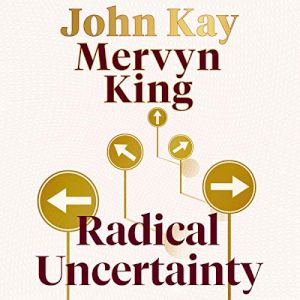24 April 2020
Radical Uncertainty
Decision‑Making or an Unknowable Future
John Kay and Mervyn King
2020, Little, Brown, 544 pages,
ISBN 9781408712603
Reviewer: Vicky Pryce

With a weird sense of timing this fascinating book by two of our better known economists, getting together to produce their second joint book after a 40 year gap, has come out at a time when much of the world is at a standstill due to enforced lockdowns and where the type of uncertainty we are facing as we try to react to the coronavirus pandemic is the worst and most acute one can remember in modern times. Mervyn (now Lord) King was Governor of the Bank of England during the financial crisis at a time when I was working for the Department for Business. And, as we have seen in the monetary and fiscal reactions to the pandemic, some lessons have been learned from the 2008 crisis with the authorities now injecting huge amounts of liquidity into the system and being prepared to substantially increase the role of the state to ‘rescue’ the economy. I have also known John Kay for a large part of my life and even worked with him very briefly in a reconstituted London Economics in the early 2000s. Their accumulated experience is worth looking at and learning from.
The authors argue early on in the book that advances in knowledge can solve some of the mysteries of the past and teach us therefore what we need - and can - to do better in the future, such as not to build bridges that collapse for example. But do we learn sufficiently from experience given, as the authors argue, that radical uncertainty is everywhere? And how can you apply that knowledge to good effect? Truth is that some bridges still collapse do to this day, even in very advanced economies! And I also suspect that if they had the chance Kay and King would want to rewrite the following passage which in the current circumstances may appear a bit too optimistic:
“Many historic catastrophes, such as the Black Death or the San Francisco earthquake, can now be avoided or minimised. The mystery of what killed almost half the population of Europe became a puzzle as medical knowledge advanced, and has now been resolved.”
Sadly we have not avoided the coronavirus outbreak and although we may have acted to minimise it, we didn’t act until it hit us in the face. We hadn’t planned for this possible alternative scenario. So what is the secret for good decision-making in an environment of radical uncertainty? It is according to the authors to move to a new way of thinking. Rather than just revising probabilities, whether in business, government or our private lives, to what may be a known list of things that may happen in the future, we should instead, based on what evidence we can gather, organise action around what may be, as they call it, a ‘reference narrative’, but be prepared to accept that that narrative may be wrong and that in fact empirical evidence opens the door to contradictory or alternative narratives.
But can we really do that? The authors give as an example the positives gained by the members of the Bank of England Monetary Policy committee where so much was gained by all members making one presumes better decisions based on discussions among them to better understand ‘what is going on here’. Only one member in its 20 years of existence apparently felt they could be just as effective by simply e-mailing their votes from home once a month without any other conduct and dispensing with the meetings and discussions.
But what about firms? When I worked on scenario planning in the oil sector in the mid 1980’s the ‘catastrophe’ scenario was the price of oil falling to below $10 a barrel. But there was no way to plan for it so we worked on what was the most likely scenario, hoping that we might hit a best case scenario for which we were also ready. But when ‘catastrophe’ hit .and prices collapsed, companies simply ceased production and just waited..
All in all this is a fascinating book. As Kay and King explain, looking through history it seems that pioneers in various areas, particularly in IT, failed after their initial success to see the wider and very large potential of their inventions, leaving it to later entrants to exploit them fully. But, generally, big firms can do it better, plan better and rely on reserves to see them through as they adapt to radically changing circumstances. Smaller ones in general can’t do it so easily. But that distinction seems to have disappeared, for a while at least, in the current coronavirus pandemic. Ironically, right now all of us -businesses, individuals and the society as a whole- have come to utterly depend for our security and survival on the largesse of governments which themselves let us all down by failing to take appropriate steps to be better prepared for life in a period of radical uncertainty. Not a comfortable position in which to be.
